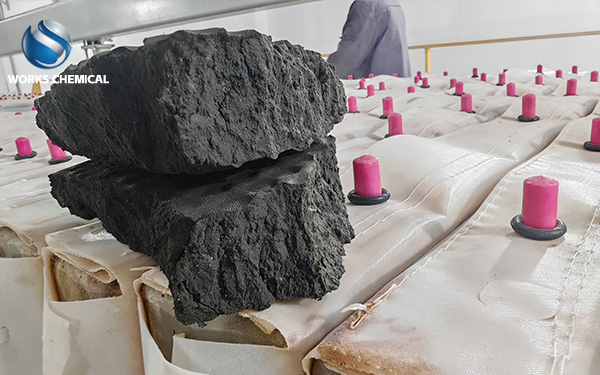
The use of sludge enhancers for deep dewatering of sludge has the following multiple benefits. Combined with technical principles and practical application cases, they can be summarized as the following core advantages:

Significantly reduce the moisture content and achieve a reduction in sludge depth
Effect data: The sludge enhancer can reduce the moisture content of sludge from over 90% to 40%-60%, and even lower it to 35%-55%. For instance, through mechanical pressing technology, the moisture content of municipal sludge can be reduced to below 55% without the addition of lime.
Technical principle: The sludge enhancer destroys the colloidal structure of the sludge, reduces the surface load and specific surface area of the solid, and releases bound water and adsorbed water, making it easier to separate water.
2. Enhance dehydration efficiency and shorten the processing cycle
Efficiency improvement: The sludge pressing efficiency of the plate and frame filter press has increased by 100% to 500%, and the sludge pressing cycle has been significantly shortened. For instance, after a certain sewage treatment plant adopted a sludge enhancer, the dewatering efficiency increased by more than 30%, and the moisture content of the sludge cake dropped from 80% to below 60%.
Process optimization: By integrating high-pressure feeding and pressing technology, the overall pressing time can be shortened, production efficiency can be enhanced, and it also supports fully automatic unloading and reverse blowing of filter cloth, reducing manual intervention.
3. Simplify the processing procedures and reduce operating costs
Reduced pretreatment: There is no need for long-term stirring or pH adjustment. The sludge dewatering performance can be improved directly by adding the sludge enhancer.
Reduced equipment maintenance costs: The fluidity of sludge is improved, reducing equipment wear and clogging, lowering the frequency of filter cloth replacement, and saving filter cloth costs and maintenance time.
4. Enhance the stability of sludge to facilitate subsequent resource utilization
Improved mobility: After dewatering, the sludge becomes drier and more solid, facilitating transportation and storage, and reducing the risk of secondary pollution.
The channels for resource utilization have been broadened: Sludge with low moisture content can be directly used for incineration, brick-making, composting or land application. For instance, when making bricks, the moisture content of the sludge must be less than 40%, and this requirement can be met after being treated with sludge enhancers.
5. A win-win situation for environmental protection and economic benefits
Environmental protection advantages: It avoids the use of traditional chemicals such as lime, reduces equipment corrosion and chloride ion emissions, and complies with environmental protection regulations.
Cost savings: The amount of sludge enhancer added is small, and no additional pretreatment steps are required, reducing the overall treatment cost. For instance, a certain sewage treatment plant has reduced the volume of sludge by over 50% through sludge enhancers, significantly lowering transportation and disposal costs.
6. Strong adaptability and wide range of application scenarios
Industry coverage: It is applicable to sludge treatment in multiple industries such as municipal, printing and dyeing, papermaking, electroplating, and chemical engineering.
Equipment compatibility: It can be used in conjunction with plate and frame filter presses, centrifuges and other equipment to optimize the existing process flow.
Summary
The sludge enhancer has broken through the technical bottleneck of sludge dewatering through the synergistic effect of chemical conditioning and physical pressing, achieving efficient, low-cost and environmentally friendly deep dewatering. Its application not only solves the problems of high moisture content and high treatment cost of sludge, but also promotes the resource utilization of sludge, which is in line with the goals of circular economy and sustainable development.